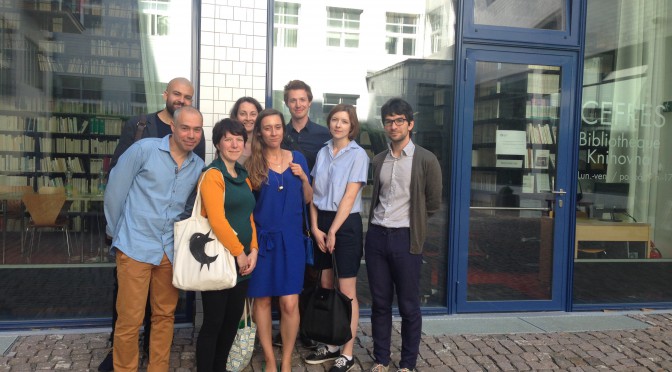
A lecture by Gábor Egry (Institute of History – Hungarian Academy of Sciences) Discussant: Rudolf Kučera (Masaryk Institute – AV ČR) Where: Na Florenci 3, building C, 3rd floor, conference room. The end of WWI in East Central Europe brought about similar developments: the collapse of empires and the emergence of nation states. But behind the … Continue reading Firefighters, Gipsy Bands, Peasant Riders, Canteens: East Central European Post-Imperial Local Societies in the World of Nation States 1918-1930 →
Clara Zgoła PhD candidate in Art, Language and Cultural studies – School for Advanced Studies in the Social Sciences/University of Warsaw Research field: cultural, urban and literary studies, history of art, cultural history (20th-21st centuries), anthropology Dissertation title: “Literary Explorations of the City: Parisian Identities of Contemporary Novelists” Period of internship: July 2017 Research interpship Eva … Continue reading List of Interns at CEFRES 2016/2017 →
Benedetta Zaccarello Contact: benedetta.zaccarello@cefres.cz is a CEFRES senior researcher from January 2017. She works on “Hybridations of Paradigms and Circulation of Traditions in the Writing of Contemporary Philosophy” looking through the manuscript archives of such philosophers as Jan Patočka and Aurobindo Ghose. Her research is embedded in CEFRES research area 1. István Pál Ádám Contact: istvan.adam@cefres.cz is from … Continue reading CEFRES Team of Researchers 2016-2017 →

Magdalena Cabaj Contact: magdalena.cabaj@cefres.cz is a PhD student in cotutelle between the University of Warsaw and the École normale supérieure in Paris under the supervision of Wincenty Cesluk-Grajewski and Dominique Lestel. Her PhD dissertation on Hermaphrodite Writing is at the crossroads between philosophy and literature, and contributes to CEFRES research area 2. Mátyás Erdélyi Contact: … Continue reading PhD Fellows Team 2016-2017 →

European Association of Jewish Studies Conference, Prague Date & Place: from 23 to 25 May 2017, Villa Lanna, Prague Language: English Organizers: Kateřina Čapková (Institute of Contemporary History, Czech Academy of Sciences), Kamil Kijek (Department of Jewish Studies, University of Wrocław), Stephan Stach (Institute of Contemporary History, Czech Academy of Sciences) Program 23 May 2017 … Continue reading Conference: New Approaches to the History of the Jews under Communism →

European Association of Jewish Studies Conference, Prague Deadline for abstracts: End of October 2016 Decision notification due: End of November 2016 Date & Place: Villa Lanna, Prague, from 23 to 25 May 2017 Language: English Organizers: Kateřina Čapková (Institute of Contemporary History, Czech Academy of Sciences), Kamil Kijek (Department of Jewish Studies, University of Wrocław), … Continue reading CFP: New Approaches to the History of the Jews under Communism →



